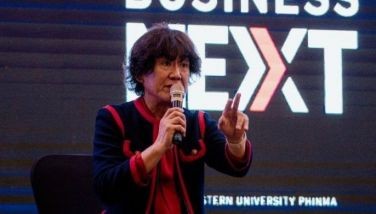Hydropower plant in Cebu remote
April 22, 2006 | 12:00am
Because of Cebu's limited water supply, the Aboitiz-led power producer Hydro-electric Development Corp. (HedCor) could not easily invest on hydropower plant to arrest the alarming shortage of power supply in Cebu in the next few years.
"Cebu has limited supply of water, as well as Visayas. These areas do not have very high potential for renewable energy, except for geothermal energy in Leyte," said Hedcor president Miguel Salas in a recent interview.
Hydro-energy is produced by transforming the kinetic energy of water movement into mechanical energy while geothermal energy comes from the heat beneath the earth's surface.
He said Hedcor, which is a Cebuano-led company, is willing to generate power in this area, however, because Hedcor is strictly a hydro-electric company, it cannot pursue power generation plant venture in Cebu.
"We are strictly a hydro electric company, we concentrate on our core competence," Salas said adding that Hedcor is limited in extending help especially in the foreseen power shortage supply in Cebu in the coming years.
Salas stressed that Cebu's inability to produce hydro and geothermal energy makes it dependent on the power to be produced by Korea Electric Co. (Kepco) and those transmitted from the Leyte geothermal plant.
Hedcor is the largest developer of hydropower in the Philippines, it has a P3.3 billion worth of generating assets in its 19 hydropower plants located in Luzon and Mindanao.
The company, a wholly-owned subsidiary of Aboitiz Power Corp. (APC), a division under the publicly listed investment vehicle, Aboitiz Equity Ventures (AEV) has continually invested in exploring new hydro-electric plants in Luzon and recently in Mindanao areas.
In the next two years, the company is expected to invest a total of P7 billion for installment of new power plants in Mindanao, Salas said.
He reiterated that power supply could have not been a problem in Cebu, if the geographical location profile is conducive for hydro-power plant exploration.
Thus, he said that Cebu could only rely on the coal-fired power plant produced by Korea Electric Co. (Kepco) aside from the geothermal power plant in Leyte.
However, he warned that coal fired energy is not considered as clean energy.
AEV is now the controlling owner of Visayas Electric Company (VECO), which distributes power supply to end users in Metro Cebu area.
In an earlier interview with AEV president and chief executive officer (CEO) Jon Ramon Aboitiz he said that the impending power shortages in 2008-2009 in the Visayas and Mindanao areas, and with National Power Corporation (NPC) no longer building power plants, the company is in discussions to begin to build power plants to supply its distribution utilities
Aside from VECO, the Aboitiz conglomerate has power distribution companies in Davao (Davao Light), and the Subic Enerzone.
"Cebu has limited supply of water, as well as Visayas. These areas do not have very high potential for renewable energy, except for geothermal energy in Leyte," said Hedcor president Miguel Salas in a recent interview.
Hydro-energy is produced by transforming the kinetic energy of water movement into mechanical energy while geothermal energy comes from the heat beneath the earth's surface.
He said Hedcor, which is a Cebuano-led company, is willing to generate power in this area, however, because Hedcor is strictly a hydro-electric company, it cannot pursue power generation plant venture in Cebu.
"We are strictly a hydro electric company, we concentrate on our core competence," Salas said adding that Hedcor is limited in extending help especially in the foreseen power shortage supply in Cebu in the coming years.
Salas stressed that Cebu's inability to produce hydro and geothermal energy makes it dependent on the power to be produced by Korea Electric Co. (Kepco) and those transmitted from the Leyte geothermal plant.
Hedcor is the largest developer of hydropower in the Philippines, it has a P3.3 billion worth of generating assets in its 19 hydropower plants located in Luzon and Mindanao.
The company, a wholly-owned subsidiary of Aboitiz Power Corp. (APC), a division under the publicly listed investment vehicle, Aboitiz Equity Ventures (AEV) has continually invested in exploring new hydro-electric plants in Luzon and recently in Mindanao areas.
In the next two years, the company is expected to invest a total of P7 billion for installment of new power plants in Mindanao, Salas said.
He reiterated that power supply could have not been a problem in Cebu, if the geographical location profile is conducive for hydro-power plant exploration.
Thus, he said that Cebu could only rely on the coal-fired power plant produced by Korea Electric Co. (Kepco) aside from the geothermal power plant in Leyte.
However, he warned that coal fired energy is not considered as clean energy.
AEV is now the controlling owner of Visayas Electric Company (VECO), which distributes power supply to end users in Metro Cebu area.
In an earlier interview with AEV president and chief executive officer (CEO) Jon Ramon Aboitiz he said that the impending power shortages in 2008-2009 in the Visayas and Mindanao areas, and with National Power Corporation (NPC) no longer building power plants, the company is in discussions to begin to build power plants to supply its distribution utilities
Aside from VECO, the Aboitiz conglomerate has power distribution companies in Davao (Davao Light), and the Subic Enerzone.
BrandSpace Articles
<
>
- Latest
- Trending
Trending
Latest
Trending
Latest
Recommended
February 3, 2025 - 12:00am























